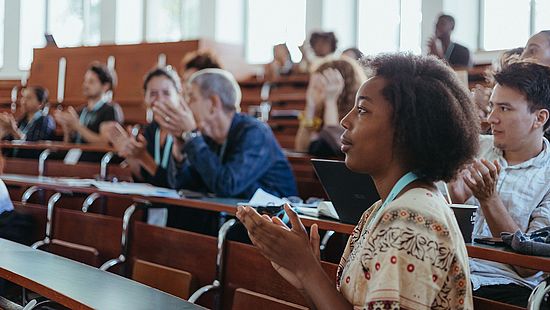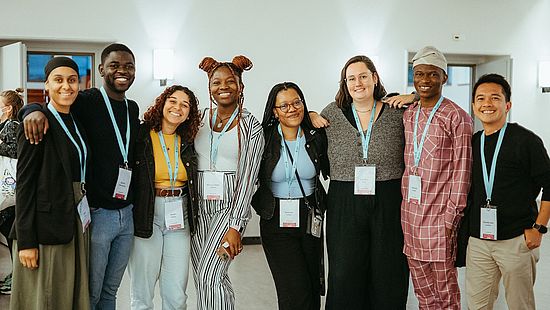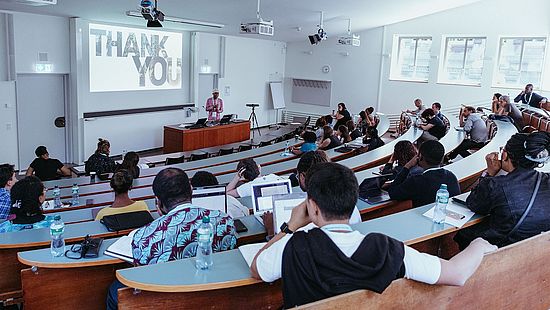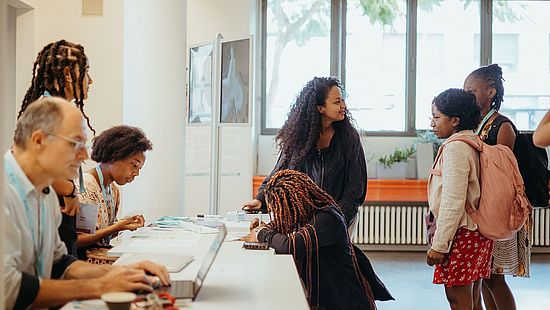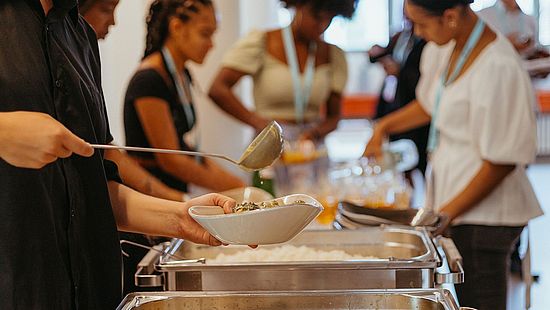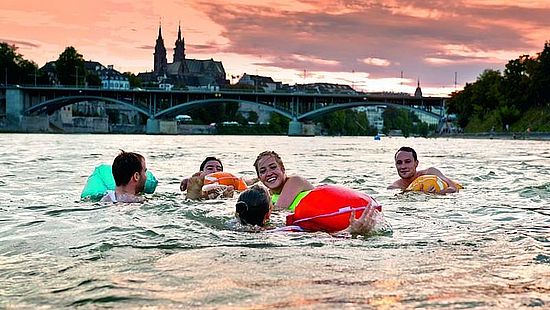TESCAS – Young Scholars Driving a Field
Welcome to the Third European Students’ Conference on African Studies (TESCAS), taking place in the historic city of Basel on 29 and 30 August 2024. Since its inception in 2007, the student conference has grown through the positive feedback from our 2022 edition, highlighting the need for its continuation. Hosted by the University of Basel’s African Studies Master Program, the conference is a beacon for fostering robust networks among Europe’s emerging scholars in African Studies.
This year's theme, ‘African Studies in Europe: Young Scholars Driving a Field’, invites Master’s students, recent graduates, and young professionals across Europe to deepen discussions about Africa’s role globally. TESCAS is more than an academic event; it is a community designed to spark connections and friendships, reduce hierarchical barriers, and promote mutual respect among participants.
Our goals are to facilitate meaningful academic and social interactions and to ensure impactful networking that extends beyond the conference. Join us for TESCAS to enjoy a blend of rigorous academic discourse and community enjoyment, continuing our tradition of excellence in scholarship and collaboration. We eagerly anticipate welcoming you to Basel to contribute your insights and join our growing legacy.
Our supporters:

Our partners:

Join TESCAS
Are you a Master's student or recent graduate? Have you researched or worked on academic projects relating to Africa? Then, join the Third European Students' Conference on African Studies at the University of Basel from 29-30 August 2024!
See you there!
Register for ESCAS 2024Lend a hand!
Interested in volunteering for our conference? There are several ways you can get involved and contribute.
Learn moreAt the end of August 2024, the Third European Students' Conference on African Studies (TESCAS) took place at the Alte Universität in Basel. In total, 40 young scholars from universities across Europe and Africa—from Poland to Portugal and from South Africa to Ghana—gathered to present their research projects.
Given the importance of empowering young scholars to ensure the continuous growth and vitality of academia, TESCAS provided an invaluable platform for Master's students to showcase their research, engage in discussions with experts, and foster interdisciplinary collaboration. More than just a space for knowledge exchange, the event became a springboard for shaping the future of African Studies, empowering emerging scholars, strengthening their academic confidence, and encouraging intellectual growth.
The conference offered participants the chance to present their work across a wide range of themes, such as Politics and Conflict, Health, Youth Participation, Citizenship and Belonging, Decoloniality and Liberation, and Art and Literature. For many, it was their first opportunity to present on an international stage, and they received valuable feedback that refined their ideas and enhanced their research. These experiences were critical, fostering a sense of belonging within the academic community while highlighting the diverse and cutting-edge research driving the field of African Studies forward.
Constructive feedback played a central role in this process. Participants encountered new perspectives and received feedback in a supportive and collegial atmosphere. This constructive critique improved their work and fostered an environment of intellectual and emotional growth—both essential for thriving in academia. The emphasis on open dialogue encouraged scholars to see critique as a growth tool rather than judgment, helping to demystify academic feedback and build resilience.
The conference's interdisciplinary nature was another key factor in its success. With diverse topics covered, participants were encouraged to explore new methodologies and think beyond traditional disciplinary boundaries. This led to rich discussions and new insights, allowing young scholars to envision the potential for cross-disciplinary collaboration in their future work. Networking opportunities played a significant role, helping scholars establish connections for future partnerships while ensuring the representation of diverse voices and perspectives in an inclusive environment.
Engagement with critical debates was another highlight of the conference. Scholars especially focused on decoloniality and the legacies of colonialism, contributing to ongoing discussions about centring African voices in the field. For many young scholars, particularly those from marginalized backgrounds, the platform allowed them to challenge dominant paradigms and propose new frameworks for understanding African realities. This engagement was empowering, offering scholars the confidence to question long-standing assumptions and present alternative perspectives.
One of the conference's standout moments was the keynote address by Mercy Hombakazi Nqandeka, titled 'Empowering Voices: Reclaiming African Narratives and Shaping Our Future'. As a Black, indigenous scholar, artist, and writer from South Africa, Nqandeka's presence as a keynote speaker underscored TESCAS's commitment to centering marginalized voices. Her powerful address inspired the audience and emphasized the importance of reclaiming African narratives in academia. By giving space to Nqandeka's unique perspective, the conference succeeded in fostering a deeper appreciation for indigenous knowledge systems and their role in shaping the future of African Studies.
The Role of Young Scholars in the Field of African Studies
The conference theme, 'Young Scholars Driving a Field', emphasized the critical role that young scholars play in shaping this interdisciplinary field, challenging conventional paradigms, and introducing new perspectives.
One of the participants eloquently summarized the spirit of the conference, stating that young scholars contribute by daring to move beyond traditional research themes and asking uncomfortable questions. They embrace uncertainty, which is not a weakness but a strength that allows them to rethink and reevaluate established concepts. 'There is a certain uncertainty in being a young scholar and a feeling of insecurity, which does not automatically need to be referred to as weakness. Much rather, this uncertainty can be seen as strength, that allows us to still rethink and reevaluate certain truths and concepts we once were so sure of'. This courage and intellectual curiosity enable young researchers to engage critically with complex issues, breaking free from academic boundaries that have long defined the study of Africa.
The diversity of experiences among young scholars was another key strength highlighted at the conference. Scholars from various backgrounds shared their unique approaches to African Studies, enriching the field with multiple perspectives. 'Each of us brought our own experiences of studying African Studies, research methods, different approaches to the subject, and shared interesting conclusions with others', noted one attendee. This diversity is one of their greatest strengths, allowing them to explore African issues through various lenses. The collaborative nature of the conference underscored how these varied experiences contribute to the innovation and vitality of African Studies.
A significant theme that emerged during the discussions was the responsibility young scholars feel towards their positionality and the narratives they engage with. 'Our generation is still struggling to emancipate the African countries from the neoliberal narrative that wants the continent to be a mere recipient of international interventions, and our research will finally challenge and prove this wrong', stressed one participant. This commitment to challenging dominant narratives and promoting decolonial approaches is central to the efforts of young researchers who seek to reframe Africa's role in the global context.
The sense of community and recognition fostered by TESCAS was a recurring sentiment among participants. One scholar emphasized, 'Reflecting on the conference, the theme 'Young Scholars Driving a Field' provided an incredible platform for scholars like myself, who are researching issues affecting the African continent, which often overlap with global concerns'. This validation is motivating and crucial in encouraging further contributions to the field.
One participant noted that 'African Studies remains less present in universities in the Global South compared to the Global North. Consequently, as young scholars, we should focus our contribution to African Studies on promoting critical research that addresses both the development of African Studies and the centrality of decoloniality. In particular, we need to examine how dominant Western epistemologies continue to influence the Global South and how they perpetuate reductionist intellectual positions'. This highlights the need for emerging scholars to engage in research that develops the field and challenges the structures that reinforce these reductionist perspectives.
As the conference concluded, one clear message resonated: young scholars are more than just following in the footsteps of their predecessors. They are actively dismantling colonial frameworks and contributing to the intellectual emancipation of African Studies. This mission is both urgent and essential for the future of the field.
The Value of Attending a Students' Conference
As one participant noted, 'attending a student conference gives me the opportunity to share my research findings and receive valuable feedback. The discussions that follow raise important questions, some of which I may not have considered. These insights help me refine and improve my research moving forward'. The conference prides itself on being a platform for exchanging ideas not only for participants to share their findings but also prompts important questions and perspectives that they may not have previously considered by themselves. Such exchange is invaluable in helping students refine and enhance their research, fostering academic growth and contributing to the broader discourse of African Studies.
On another note, skills development, especially in communication and public speaking, is a major value attached to the conference. Presenting ongoing or completed research findings to a mixed audience was seen as one of the major essences of the conference. It allowed students to hone their public speaking and effective communication skills, allowing them to prepare for future academic and professional experiences. 'The value lies in the collective aspect that it was the first time presenting for most of us', one of the participants noted.
'Experiencing what African Studies looks like at different universities, making contacts, learning about other perspectives, paying attention to topics/issues that you haven't heard of before. And broadening horizons, definitely!', noted one of the participants. This suggests how the conference provided a platform for exposure to diverse perspectives. The mobilization of students from diverse cultural and academic backgrounds created the platform for exposure to different perspectives and research approaches, broadening attendees' understanding of various topics.
Building Bridges: Networking beyond the Academia
One of TESCAS's core objectives was to foster meaningful networking opportunities for young scholars in the field of African Studies. Based on participant feedback, the event not only provided formal and informal avenues for interaction but also created lasting connections beyond the academic setting.
A major theme that emerged from the feedback was the ample provision of informal spaces for attendees to connect. Students could build relationships in relaxed environments - whether during coffee breaks, lunches, the conference dinner, or social activities like swimming in the Rhine. One participant remarked: 'I still cannot believe how a small chat on the tram about thrift shopping and shoes can lead to a conversation about Zimbabwean protest theatre in the seminar room, to be then concluded by a talk on swimming while swimming in the Rhine; or, how people at dinner tables started reading their secret poetry, started sharing their innermost feelings; or, how a talk on the Rhine's riverbank on the use of AI in African studies led me to rethink my research topic again.' These moments of spontaneous exchange played a vital role in forging deeper connections that bridged academic discussions and personal experiences.
The social events, particularly the swimming in the Rhine, the city tour hosted by Dr. Veit Arlt as well as the Apero's and the conference dinner, were repeatedly mentioned as highlights. One attendee reflected on how informal moments like these allowed them to connect with others personally, noting that 'the small little moments—such as the swimming in the river or the talks during the food time—were really beautiful'. The shared accommodations also played a crucial role, with another participant sharing how this experience allowed them to build lasting friendships with their roommates. These moments of informal interaction extended well beyond the conference sessions, blending personal enjoyment with professional dialogue.
For many, the identification factor—connecting with like-minded scholars—was a powerful element of the networking experience. The sense of belonging, particularly for students studying African Studies in a European context, was emphasized by several attendees. One participant reflected on how the conference helped mitigate the occasional sense of isolation they experience: 'Sometimes, one can feel a bit isolated or lonely in a European setting studying Africa. However, here, it was absolutely normal'.
The overall feedback was highly positive, and some participants expressed a desire for more time to connect. As one attendee mentioned, 'I tried to spend enough time with all of the other presenters, but time was running so quickly. I felt I wanted more'. This sentiment underscores the value of the connections made and suggests that future conferences might consider extending social and networking opportunities even further.
In conclusion, the networking opportunities at the TESCAS conference were widely appreciated by attendees, both in formal sessions and through informal moments that allowed for deep, meaningful exchanges. Whether it was through spontaneous chats on the tram, swimming in the Rhine, or sharing a meal, TESCAS provided numerous pathways for young scholars to connect, collaborate, and foster relationships that will undoubtedly extend far beyond the two-day conference.
Lessons Learnt
Based on the outcome of the conference, one of the major lessons learnt is to encourage cross-regional participation at future conferences. Future conferences could thrive to actively increase the representation of students from African universities and a wider range of disciplines from outside African Studies, which would enhance the exchange of knowledge and broaden the academic scope of the conference. 'We should have more students from African Universities, and more students from not African Studies settings (someone from anthropology, sociology, political science etc. who just finalized her/his MA thesis on a topic in Africa could learn a lot from being with African Studies students and vice versa)', one of the participants noted.
Funding
This project was made possible through our donors' generous financial support, and we sincerely thank them for enabling us to reach our goals and fulfil our potential. We are particularly grateful to the Swiss Academy of the Social Sciences and Humanities, the Freiwillige Akademische Gesellschaft Basel, the Max Geldner Stiftung, the Swiss Society for African Studies, and the Centre for African Studies at the University of Basel. Their contributions have been vital to the success of TESCAS, and we deeply appreciate their dedication to fostering knowledge exchange among young scholars in the field of African Studies.
Catharina Deeg, Aileen Diewald, Wahab Lawundeh, and Fabian Zesiger
Mercy Nqandeka - 'Empowering Voices: Reclaiming African Narratives and Shaping Our Future'

Mercy Nqandeka (Photo: Andrin Fretz)
We are thrilled to introduce our keynote speaker Mercy Nqandeka, a South African scholar, artist and writer. Mercy was born and raised in the Eastern Cape and holds a BSc and Honors degree in Soil Science from the University of Fort Hare, South Africa. Additionally, she earned a double Master's degree from the National University of Ireland and the SupAgro Institute in Montpellier, France. Currently, Mercy is pursuing a PhD in Health Sciences at Stellenbosch University, focusing on indigenous knowledge systems.
Mercy is not only a bright and critical scholar but also a highly creative individual. She runs a beading and Xhosa craft-making company in Elliotdale, South Africa. Furthermore, she has authored three books: 'The Dissonant Rainbow' (2019), 'To My Young Self' (2020), and 'Don’t Upset ooMalume: A Guide to Stepping Up Your Xhosa Game'.
Interested in volunteering for the Third European Students' Conference on African Studies? There are several ways you can get involved and contribute:
- Offer Accommodation: Do you have extra space and would like to offer accommodation for one or more participants? Your generosity can make a significant difference in ensuring attendees have a comfortable and enjoyable experience during their stay.
- Volunteer at the Conference: We already have a dedicated team of volunteers, but we are always looking for more helping hands. Tasks may include picking up participants from train stations or airports, directing attendees during the conference, and assisting with various on-site activities. Let us know if you are interested, and we will determine the number of volunteers needed and assign tasks accordingly.
- Become a Social Media Ambassador: Are you passionate about spreading the word and engaging with others on social media? You can become an ambassador and multiplier by sharing our conference updates, announcements, and insights on your social media channels. Your support can help us reach a wider audience and create buzz around the event.


We are thrilled that you are interested in joining us for Third European Students' Conference on African Studies! To help us plan effectively for the number of participants, we kindly request that you register as soon as possible but latest by 16 August 2024. The registration fee of CHF 50.- will be levied upon arrival.
As a registered participant, you will not only have the unique opportunity to connect with students from other European universities and share ideas and build lasting relationships, but the conference will also offer you access to wealth of knowledge and experiences and also enable you to create a network with other students from diverse backgrounds. You will also have the opportunity to engage in thought-provoking discussions and present your master’s project/project. By registering, you will be granted complimentary breakfasts, coffee breaks, lunch, and a spectacular conference dinner on the final night!
Please check with your university if they can support you with your expenses related to the conference participation. We will support participants according to their economic situation, their ability to tap into funding, the actual cost of travel, and the means at our disposal.
Organizing Committee
We are a group of four enthusiastic students dedicated to organizing an engaging and impactful conference. Our team brings together diverse backgrounds, experiences and expertise to ensure a successful and enriching event. Meet our team members below!

Wahab Lawundeh, hailing from Sierra Leone, West Africa, embarked on his academic journey by earning a Bachelor's Degree in Sociology with a focus on Anthropology. Now a first-semester student in the MA African Studies program at the University of Basel, Wahab is grateful to the Stipendienkommission für Nachwuchskräfte aus Entwicklungsländern for providing him with a scholarship. He joined the Second European Students' Conference on African Studies (TESCAS) with the goal of expanding his network among peers from various European universities and beyond. TESCAS, which encourages Master’s students and recent graduates to present and engage in discussions on a wide range of topics, offers Wahab a platform to share and enhance his understanding of subjects closely related to his academic pursuits and personal experiences.
We are a group of four enthusiastic students dedicated to organizing an engaging and impactful conference. Our team brings together diverse backgrounds, experiences and expertise to ensure a successful and enriching event. Meet our team members below!

Catharina Deeg (Photo: JF Photography)
Catharina Deeg, a first-semester student in the Master’s program in African Studies at the University of Basel, is enthusiastic about the upcoming conference, fueled by her passion for building connections among peers and recent graduates with a shared focus on African studies. Originating from Germany, obtaining her bachelor's degree in the Netherlands, and continuing her academic pursuits in Switzerland, Catharina is especially keen on collaborating with peers from diverse backgrounds. She views the conference as an excellent opportunity for active engagement, networking, and collaborative learning, enhancing her academic and professional development in the field.

Aileen Diewald (Photo: JF Photography)
Aileen Diewald has cultivated a rich academic background since moving from the Black Forest area to Switzerland a decade ago, where she completed her Bachelor's degree in Social Anthropology and Sociology. Now in her final year as a Master's student in African Studies, Aileen has enriched her education with transformative experiences abroad, including a student exchange in Namibia in 2022 and field research in Cape Town, South Africa, in 2023 for her Master's thesis. Her academic and research passions are centered around gender equality, sexual and reproductive health, and participatory research methods. Aileen is eager to connect with fellow scholars, exchange innovative ideas, and delve into diverse perspectives at the upcoming conference.

Wahab Lawundeh (Photo: JF Photography)
Wahab Lawundeh, hailing from Sierra Leone, West Africa, embarked on his academic journey by earning a Bachelor's Degree in Sociology with a focus on Anthropology. Now a first-semester student in the MA African Studies program at the University of Basel, Wahab is grateful to the Stipendienkommission für Nachwuchskräfte aus Entwicklungsländern for providing him with a scholarship. He joined the Third European Students' Conference on African Studies (TESCAS) with the goal of expanding his network among peers from various European universities and beyond. TESCAS, which encourages Master’s students and recent graduates to present and engage in discussions on a wide range of topics, offers Wahab a platform to share and enhance his understanding of subjects closely related to his academic pursuits and personal experiences.

Fabian Zesiger (Photo: JF Photography)
Fabian Zesiger, currently pursuing Psychology at the University of Basel, has joined the Third European Students' Conference on African Studies (TESCAS) driven by its focus on academic collaboration and the development of practical conference organization skills, essential in his field. He finds the conference particularly compelling as it provides a venue to delve into innovative research methods and emerging trends. Engaging with a spectrum of perspectives not only expands his academic scope but also supports his dedication to incorporating interdisciplinary insights into his scholarly work. This integration enhances his ability to contribute meaningfully to the academic community.
We are privileged to have an esteemed advisory board comprising academics who have organized and contributed to the previous two conferences. Their wealth of experience and academic backgrounds will guide and support us in creating a successful and impactful conference. Get to know our advisory board members below!

Prof Claudia Gastrow, PhD, North Carolina State University
Claudia Gastrow, a trailblazer in African Studies, was among the inaugural students of the Master's program at the University of Basel, graduating in 2007 as an ESKAS fellow. Her academic foundation was laid in History at the University of Cape Town. Her scholarly pursuit took her to the University of Chicago, where she achieved her PhD in Social Anthropology in 2014. Claudia enriched her academic career with postdoctoral positions at the University of the Witwatersrand and later served as a lecturer at the University of Johannesburg. In 2023, she advanced her career further by joining North Carolina State University as an associate professor in the Department of Sociology and Anthropology. Notably, Claudia was the visionary initiator of the first European Students’ Conference on African Studies in 2007, demonstrating her longstanding dedication to fostering academic discourse and collaboration.

Raluca-Maria Marcu, BA, University of Basel
Raluca Marcu, a dynamic graduate from Alexandru Ioan Cuza University in Iaşi, Romania, secured her Bachelor's degree in Communication Sciences in 2021. She soon ventured further into academia by joining the innovative Master’s program in African Studies at the University of Basel in the spring of 2022. Diving into practical learning early on, Raluca played a pivotal role in orchestrating the Second European Students' Conference on African Studies held in August 2022, showcasing her leadership and organizational skills. Presently, she is a dedicated student assistant at the Centre for African Studies and is approaching the culmination of her master's journey.

Prof Moritz Mihatsch, PhD, University of Cambridge
Moritz Mihatsch completed his MA in History, complemented by studies in German Literature and International Relations, at the University of Zurich in 2006. His academic journey included a guest semester at Al-Azhar University in Cairo, where he immersed himself in Islamic Theology. He advanced his studies with a PhD in Political Science, awarded in 2014, and subsequently shared his expertise as a lecturer at the British University in Egypt and as an assistant professor at Future University in Cairo. Moritz then took his talents to the University of Cambridge, where he currently serves as an assistant professor of World History. He also played a key role in organizing the first European Students' Conference on African Studies in 2007 conference, further highlighting his commitment to academic collaboration and scholarship.

Franziska Rüedi, PhD, University of Zurich
Franziska Rüedi, who was among the organizing students of the inaugural students' conference, completed her Master’s degree in African Studies at the University of Basel in 2007. Subsequently, she pursued her doctoral studies at the University of Oxford, earning her PhD in History. She then relocated to South Africa, where she conducted postdoctoral research on collective violence and subjectivity during the transition period in South Africa at the University of the Witwatersrand. Since 2020, she has been a postdoctoral researcher at the University of Zurich, focusing on transnational solidarity. In the autumn semester of 2023, Franziska represented Prof. Dr. Joël Glasman at the University of Bayreuth, Germany.
Anna Vögeli, MA

Anna Vögeli earned her Master in African History a the Universtiy of Basel in 2009 and was co-organizer of the first European Students' Conference on African Studies. As a researcher at the University of Basel, Anna investigated notions of democracy in the local histories of Shiluvane, a rural village in Limpopo Province, South Africa. She then specialised as an archivist, working with the Basler Afrika Bibliographien, a Namibia Resource Centre and Southern African Library, before she further specialised in digital long term archiving (LTA). Since 2022 she is in charge of LTA at the library of the University of Bern.



The conference will be held in Basel, strategically situated close to the borders of Germany and France, making it easily accessible for attendees from various countries by train, bus, or plane. The University of Basel encourages everyone to reduce their carbon footprint, so please consider this when choosing your mode of travel. This central location offers ample cultural exploration and networking opportunities beyond the conference walls. With diverse attractions, including the iconic Rhine River, vibrant culinary scenes, and world-renowned museums, Basel promises a memorable experience for all visitors. We eagerly anticipate gathering in Basel for an engaging and internationally connected event.
Venue
The conference takes place at the Alte Universität - the first site of the University of Basel dating back to 1460. The lecture halls of the historic building overlook the Rhine. Freight ships from Rotterdam pass by on their way to the last navigable port just upstream of Basel while, closer to the river banks, swimmers float down the river.
Address:
Rheinsprung 9
4051 Basel
How to get there:
From the tram or bus stop "Schifflände" walk towards the bridgehead and take the steep alley leading uphill towards the cathedral (Münster). After 50 metres enter the terrasse to your left.
If you have any questions or require further information, please don't hesitate to contact us. The TESCAS Organizing Committee is available to assist you. Feel free to email us if you need clarification on conference details or have any concerns. Additionally, you can stay up-to-date with the latest news and insights by following us on Instagram.
Please don't hesitate to contact us whenever you need assistance - we're just a message away!
In urgent cases, please contact the ZASB executive office.


